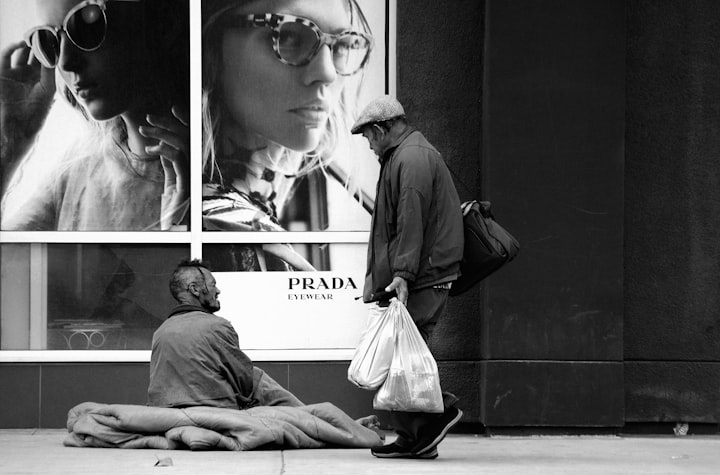The Psychological Impact of Capitalism
How Profit Has Superseded Human Life and Social Responsibility
Capitalism is an economic system that values profit above all else. It incentivizes individuals and corporations to maximize their profits at any cost, even if it means neglecting the needs and well-being of human beings. This has led to a societal shift in values, where the accumulation of wealth is considered more important than the preservation and value of human life. In this blog post, we will explore how capitalism has shaped people's beliefs and minds to not care about human life, but rather focus on profit, and how this has resulted in social inaction from a psychological systemic perspective.
Everything that is not profit is discardable.
In a capitalist society, profit is the driving force behind economic decisions. The goal of every business is to make as much money as possible, and this can lead to a variety of negative consequences. For example, companies may cut corners on safety measures to increase profits, which can put workers and consumers in danger. Similarly, corporations may exploit natural resources without regard for the environment, resulting in pollution and ecological damage.
The profit motive also incentivizes individuals to focus on their own personal gain at the expense of others. This can manifest in a variety of ways, from hoarding resources to exploiting vulnerable populations for profit. Reducing social support systems that prevent people from gathering power that could destabilize the profit drive system. And let’s not forget about the dehumanization of individuals as collateral damage and replaceable. In a capitalist society, success is often measured by financial gain, and this can lead individuals to prioritize their own wealth over the needs of others.
Inequality as the Norm

Another way that capitalism shapes people's beliefs and minds is by normalizing inequality. In a capitalist society, wealth is concentrated in the hands of a few, while many struggle to make ends meet. This creates a system where inequality is seen as natural and inevitable, rather than a problem that needs to be addressed.
As a result, people may become desensitized to the suffering of others, particularly those who are marginalized or disadvantaged. They may view poverty, homelessness, and other forms of social inequality as the fault of individuals rather than a systemic issue. This can lead to a lack of empathy and a reluctance to take action to address social injustices.
The norm of this is how things are is what perpetuates capitalism and it’s grasp in society and those beliefs, just like trauma are passed from generation to generation where systems of oppression that benefit capitalism become reinforced as a form of survival and comfort.
The Culture of Individualism

Capitalism also promotes a culture that reinforces individualism, where success is often measured by personal achievements rather than collective efforts. This can lead people to compete with others, take advantage of societal constructs of privilege, and prioritize their own interests over the needs of others, which can result in social inaction and apathy.
Individualism can also contribute to a lack of community engagement and social connection. Depression, isolation, and the destruction of community can be traced to the effects of capitalism. When people are focused solely on their own success, they may not see the value in building relationships with others or contributing to their community. This can lead to a sense of isolation and disconnection from others, further exacerbating the societal issues created by capitalism.
Moreover, strengthening the community does not benefit capitalism because it unites people with empathy and reduces profit. It leads to people gathering, connecting, and taking action, which is not something capitalism thrives on.
Example:
In a collectivistic society:

My neighbor Bob and I live in a community with five other families; the families all gather, share and support one another in times of need in the neighborhood. When I need a mower, Bob gives me his, and I can always count on Bob. When Bob is not home, I go to Carla; she lends me hers and even helps me trim my grass with her sons. The burden of mowing is shared among the community, benefiting the elderly who cannot do it themselves. Now it’s 2018, and Bob lost his home and must move away. Everyone in the community loves Bob, so now we have five upset families talking about how Bob must move because of the greed of bankers. Now we are all angry. We feel more compelled to support Bob, so we help him and his family, but you know what, we will also write to our representatives a very angry letter, protest, and talk to our other friends about the irresponsibility of Wall Sreet and their influence on the government with our community leaders.
In the individualistic capitalist society.

Bob has his things, his home; he comes and goes, only maybe saying Hi occasionally when we run into each other on the street.
I don’t know, Bob. One day he just goes away from the neighborhood. Days go by, and I say, "Oh wow, I never saw the guy down the street again. He must have moved."
Psychological Systemic Perspective '

From a systemic psychological perspective, capitalism can be seen as a complex system that shapes people's beliefs, attitudes, and behaviors. Capitalism creates a set of incentives and rewards that encourage individuals to prioritize profit and personal gain over the needs of others. This can lead to a culture where social responsibility and empathy are devalued, and wealth accumulation is seen as the ultimate goal.
At the same time, capitalism can create a sense of powerlessness and disempowerment among individuals. When pursuing profit is the primary goal, people may feel like they have little control over their lives and the world around them. This can contribute to a sense of hopelessness and apathy, further perpetuating the societal issues created by capitalism.
To address these issues, it is essential to recognize the systemic nature of capitalism and work towards creating alternative economic systems that prioritize social responsibility and the well-being of all individuals. This requires a shift in values and attitudes prioritizing human life and the common good over profit and personal gain and a commitment to creating a more just and equitable society for all.
How do I destabilize capitalism as an individual?
While capitalism has deeply ingrained certain beliefs and behaviors within individuals, it is still possible for individuals to take action to destabilize these patterns and work towards a more equitable and just society. Here are a few ways that individuals can take action:
Educate Yourself and Others
One of the most important steps individuals can take is to educate themselves and others about the negative impacts of capitalism on society. This can involve reading books, attending workshops, and engaging in discussions with others to understand better how capitalism works and how it affects people's lives. By sharing this knowledge with others, individuals can help to raise awareness and promote a more critical perspective on the current economic system.
Support Alternative Economic Models

Individuals can also act by supporting alternative economic models prioritizing social and environmental responsibility over profit. This can involve supporting local cooperatives, community-based initiatives, and socially responsible businesses. By supporting these organizations, individuals can help create a demand for more ethical and sustainable economic practices.
Participatory Economics: This model, also known as parecon, is based on the principles of equity, diversity, and self-management. Under this model, workers and consumers have an equal say in decision-making processes in organizations. The economy is organized into worker and consumer councils, which negotiate with each other to determine production and consumption plans. Parecon aims to eliminate class divisions and promote social justice.
Gift Economy: This model is based on the idea of giving and receiving gifts without the expectation of immediate or direct return. In a gift economy, goods and services are exchanged based on social relationships and obligations rather than market transactions. This model has been practiced in some indigenous communities and has been proposed as an alternative to the profit-driven capitalist system.
Socialism: This model advocates for collective ownership and control of the means of production, distribution, and exchange. Socialism aims to eliminate the sole profit motive model that drives consumerism today and promote social welfare through democratic decision-making processes. Different forms of socialism have been proposed, including market socialism and democratic socialism.
Degrowth: This model challenges the growth-oriented capitalist system and advocates for a gradual reduction in production and consumption to achieve sustainability and social equity. Degrowth aims to create a steady-state economy where the priority is on human well-being rather than economic growth. This model has been proposed as a response to the ecological and social crises caused by the capitalist system.
Cooperative Economics: This model is based on cooperation, mutual aid, and solidarity principles. Under this model, economic enterprises are owned and controlled by their members, who share the profits and decision-making power. Cooperatives can exist in different sectors, including agriculture, housing, and finance. Cooperative economics aims to promote community self-reliance and democratic decision-making.
Participate in Social Movements

Another way individuals can take action is by participating in social movements that challenge the current economic system and promote social justice. This can involve joining protests, signing petitions, and engaging in direct action to disrupt the status quo. By working with others collectively, individuals can help create the political and social pressure needed to bring about change.
Foster Empathy and Connection

Finally, individuals can take action by fostering empathy and connection with others. By building relationships with people from different backgrounds and experiences, individuals can better understand how capitalism affects different communities. This can lead to greater solidarity and a shared commitment to promoting social justice and equality.
Start connecting with your community.

Go out, and get to know your neighbors—the people in your city and communities. Get involved when someone doesn’t; Capitalism wants you to stay disconnected.
Educate Yourself and Others
"Capital in the Twenty-First Century" by Thomas Piketty (2013)
"The Shock Doctrine: The Rise of Disaster Capitalism" by Naomi Klein (2007)
"No Logo: Taking Aim at the Brand Bullies" by Naomi Klein (1999)
"A Brief History of Neoliberalism" by David Harvey (2005)
"The Spirit Level: Why More Equal Societies Almost Always Do Better" by Richard Wilkinson and Kate Pickett (2010)
Support Alternative Economic Models
"Solidarity Economy I: Building Alternatives for People and Planet" by Emily Kawano and Julie Matthaei (2013)
"Local Dollars, Local Sense: How to Shift Your Money from Wall Street to Main Street and Achieve Real Prosperity" by Michael Shuman (2012)
"The Next System Project: New Political-Economic Possibilities for the 21st Century" by Gar Alperovitz, Gus Speth, and Joe Guinan (2016)
"The End of Capitalism As We Knew It: A Feminist Critique of Political Economy" by J.K. Gibson-Graham (1996)
"The Wealth of Networks: How Social Production Transforms Markets and Freedom" by Yochai Benkler (2006)
Participate in Social Movements
"This Changes Everything: Capitalism vs. The Climate" by Naomi Klein (2014)
"The New Jim Crow: Mass Incarceration in the Age of Colorblindness" by Michelle Alexander (2010)
"The Shock Doctrine: The Rise of Disaster Capitalism" by Naomi Klein (2007)
"The People's History of the United States" by Howard Zinn (1980)
"No Logo: Taking Aim at the Brand Bullies" by Naomi Klein (1999)
Foster Empathy and Connection
"The Empathy Exams" by Leslie Jamison (2014)
"The Social Animal: The Hidden Sources of Love, Character, and Achievement" by David Brooks (2011)
"Daring Greatly: How the Courage to Be Vulnerable Transforms the Way We Live, Love, Parent, and Lead" by Brené Brown (2012)
"The Art of Empathy: A Complete Guide to Life's Most Essential Skill" by Karla McLaren (2013)
"The Power of Connection: Recent Developments in Relational-Cultural Theory" by Judith Jordan and Laura Miller (2011)
I am no expert; I am no politician. I am an individual training as a mental health professional from a systemic lens. I am tired of seeing how capitalism has shaped people's beliefs and minds negatively; it is still possible for individuals to take action to destabilize these patterns and work towards a more just and equitable society. By educating themselves and others, supporting alternative economic models, participating in social movements, and fostering empathy and connection, individuals can help to create a more sustainable and compassionate world for all. But it starts with getting up, connecting, speaking, and moving together.
About the Creator
Geomara Flores
I’m Geo, a writer, illustrator, and Marriage and Family Therapy graduate student. I believe in the importance of information and knowledge, and I write about psychology, mental health, spirituality, and social justice.







Comments
There are no comments for this story
Be the first to respond and start the conversation.